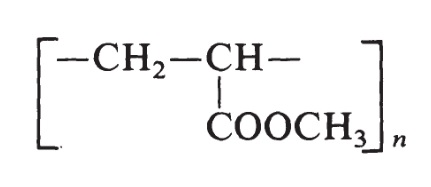
Поли(метил акрилат)
- английское имяPOLY(METHYL ACRYLATE)
- CAS №9003-21-8
- CBNumberCB8195335
- ФормулаC4H6O2
- мольный вес86.09
- EINECS203-625-9
- номер MDLMFCD00084441
- файл Mol9003-21-8.mol
| Температура кипения | 110 °C |
| плотность | 1.22 g/mL at 25 °C |
| Tg | 5 |
| плотность пара | >1 (vs air) |
| показатель преломления | n |
| Fp | 40 °F |
| температура хранения | Flammables area |
| форма | Liquid |
| цвет | Clear |
| Вязкость | 60cp(Brookfield viscosity) |
| Непрямые добавки, используемые в веществах, контактирующих с пищевыми продуктами | POLYMETHYL ACRYLATE |
| Специальный комитет по веществам GRAS | Methyl acrylate, polymeric (packaging) |
| Система регистрации веществ EPA | 2-Propenoic acid, methyl ester, homopolymer (9003-21-8) |
| UNSPSC Code | 12162002 |
| NACRES | NA.23 |
| Коды опасности | F,Xn |
| Заявления о рисках | 11-38-48/20-63-65-67 |
| Заявления о безопасности | 36/37-46-62-16 |
| РИДАДР | UN 1294 3/PG 2 |
| WGK Германия | 2 |
| Температура самовоспламенения | ~896 °F |
| TSCA | TSCA listed |
| кода HS | 32082010 |
рисовальное письмо(GHS)
-
рисовальное письмо(GHS)



-
сигнальный язык
опасность
-
вредная бумага
H315:При попадании на кожу вызывает раздражение.
H225:Легковоспламеняющаяся жидкость. Пары образуют с воздухом взрывоопасные смеси.
H304:Может быть смертельным при проглатывании и последующем попадании в дыхательные пути.
H336:Может вызывать сонливость или головокружение.
H373:Может поражать органы (Нервная система) в результате многократного или продолжительного воздействия при вдыхании.
H361d:Предполагается, что данное вещество может отрицательно повлиять на неродившегося ребенка.
-
оператор предупредительных мер
P210:Беречь от тепла, горячих поверхностей, искр, открытого огня и других источников воспламенения. Не курить.
P261:Избегать вдыхания пыли/ дыма/ газа/ тумана/ паров/ аэрозолей.
P281:Пользоваться надлежащим индивидуальным защитным снаряжением.
P301+P310:ПРИ ПРОГЛАТЫВАНИИ: Немедленно обратиться за медицинской помощью. Прополоскать рот.
P331:немедленно всю загрязненную одежду. Промыть кожу водой. Не вызывать рвоту!
Поли(метил акрилат) химические свойства, назначение, производство
Химические свойства
clear liquidИспользование
PMA/methylamine borane (MeAB) composites, prepared by solution blending process finds uses as a hydrogen storage material with better dehydrogenation property compared to MeAB.Подготовка
The structure of methyl acrylate is H2C=CH-COOCH3. The monomer used to prepare poly(methyl acrylate) is produced by the oxidation of propylene. The resin is made by free-radical polymerization initiated by peroxide catalysts and has the following formula:
Poly(methyl acrylate) resins vary from soft, elastic, film-forming materials to hard plastics.
Методы производства
Prepared by the polymerization of acrylic and methacrylic acids or their esters, e.g. butyl ester or dimethylaminoethyl esterОпределение
ChEBI: An acrylate macromolecule composed of repeating methoxycarbonylethylene units.Безопасность
Polymethacrylate copolymers are widely used as film-coating materials in oral pharmaceutical formulations. They are also used in topical formulations and are generally regarded as nontoxic and nonirritant materials.Based on relevant chronic oral toxicity studies in rats and conventionally calculated with a safety factor of 100, a daily intake of 2–200 mg/kg body-weight depending on the grade of Eudragit may be regarded as essentially safe in humans.
хранилище
Dry powder polymer forms are stable at temperatures less than 30°C. Above this temperature, powders tend to form clumps, although this does not affect the quality of the substance and the clumps can be readily broken up. Dry powders are stable for at least 3 years if stored in a tightly closed container at less than 30°C.Dispersions are sensitive to extreme temperatures and phase separation occurs below 0°C. Dispersions should therefore be stored at temperatures between 5 and 25°C and are stable for at least 18 months after shipping from the manufacturer’s warehouse if stored in a tightly closed container at the above conditions.
Методы очистки
Precipitate it from a 2% solution in acetone by addition of water.Несовместимости
Incompatibilities occur with certain polymethacrylate dispersions depending upon the ionic and physical properties of the polymer and solvent. For example, coagulation may be caused by soluble electrolytes, pH changes, some organic solvents, and extremes of temperature. For example, dispersions of Eudragit L 30 D, RL 30 D, L 100-55, and RS 30 D are incompatible with magnesium stearate. Eastacryl 30 D, Kollicoat MAE 100 P, and Kollicoat MAE 30 DP are also incompatible with magnesium stearate.Interactions between polymethacrylates and some drugs can occur, although solid polymethacrylates and organic solutions are generally more compatible than aqueous dispersions.
Регуляторный статус
Included in the FDA Inactive Ingredients Database (oral capsules and tablets). Included in nonparenteral medicines licensed in the UK. Included in the Canadian List of Acceptable Non-medicinal Ingredients.Поли(метил акрилат) запасные части и сырье
сырьё
Поли(метил акрилат) поставщик
| поставщик | телефон | страна | номенклатура продукции | благоприятные условия |
|---|---|---|---|---|
| +86 13288715578 +8613288715578 |
China | 12825 | 58 | |
| +8617732866630 | China | 18147 | 58 | |
| 86-13657291602 | CHINA | 22963 | 58 | |
| +86-023-6139-8061 +86-86-13650506873 |
China | 39894 | 58 | |
| +86-029-81138252 +86-18789408387 |
China | 3889 | 58 | |
| +8617531153977 | China | 5855 | 58 | |
| +86-0371-86658258 +8613203830695 |
China | 30233 | 58 | |
| +86-29-89586680 +86-15129568250 |
China | 22787 | 58 | |
| United States | 24072 | 58 | ||
| +1-+1(833)-552-7181 | United States | 52924 | 58 |